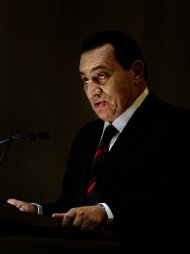 By HAMZA HENDAWI - Associated Press | AP – 59 mins ago
By HAMZA HENDAWI - Associated Press | AP – 59 mins agoCAIRO (AP) — Ousted President Hosni Mubarak has denied any responsibility for his security forces killing nearly 900 protesters during Egypt's uprising, according to a transcript of his interrogation published on Thursday.
Asked to explain the killings, Mubarak dismissed the lethal crackdown by saying:
"Our people and our security are like that."
Mubarak, 83, is in custody in an Egyptian hospital. He faces charges of ordering the use of deadly force against demonstrators during the 18-day revolt that swept him from power in February. He has rarely been heard from since and the transcript offers the public his most extensive comments yet about the final days of his three-decade rule.
Judicial officials confirmed to The Associated Press that the transcript is authentic. They spoke on condition of anonymity because of the sensitivity of the subject. Mubarak's chief defense lawyer, Farid el-Deeb, told the AP that part of what was published had been fabricated, but declined to elaborate.
The transcript was leaked in the midst of a new wave of protests across the country, one of them a week-old sit-in in Cairo's Tahrir Square, where protesters camped night and day for almost the entire uprising.
Justice for the uprising's victims is among the hottest issues in Egypt's bumpy transition to democracy. And the protesters camping out in Tahrir are demanding that those behind the killings be swiftly tried. They accuse the military generals who took over from Mubarak of stalling on the prosecutions.
Mubarak comes across in the transcript as aloof and totally out of touch with the fury his regime created.
Asked to explain why he thought protesters were killed and wounded, he said: "I cannot say exactly." He later added that there was chaos, with the security forces and the protesters attacking each other.
"No one would have paid any attention to me or my orders," he said when asked why he did not stop the violence. He claimed he gave clear orders that no force be used against the protesters.
The transcript was published Thursday by two independent newspapers, Al-Youm al-Sabea and Al-Dustour. Al-Youm al-Sabea published photographs of what it said were the original handwritten notes of the interrogators on its website.
Mubarak is under arrest at a hospital in the Red Sea resort of Sharm el-Sheikh. He faces trial next month over the protesters' deaths. He also faces charges of corruption along with his two sons, businessman Alaa and one-time heir apparent Gamal. If convicted, Mubarak could face a maximum sentence of death.
The former president also denied corruption allegations, seeking to explain why a bank account in his name held millions of dollars in foreign donations intended for the construction and upkeep of a massive library in the Mediterranean port city of Alexandria.
He said he had secretly kept the money from the library's management so they could not claim it or use it for purposes not related to the facility.
He also denied he was a friend of businessman Hussein Salem, whose extradition from Spain is demanded by Egypt. Salem is wanted for trial on corruption charges, mostly arising from his alleged use of Mubarak's name to buy state land cheaply.
Mubarak tried to fend off charges that he ordered, knew of, or condoned the use of deadly force against protesters. He said he was kept in the dark by top aides as to the gravity of the situation during the uprising.
He said he did not know of the protesters' demand until the uprising began on Jan. 25. And he appeared to criticize the army he called out to the streets on Jan. 28 after a day of deadly clashes between protesters and police.
"I asked the armed forces to intervene to bring discipline back to the streets and assume a security role ... but, because of the nature of their job, they could not handle it and did not carry out the job as required."
He made light of the events on Feb. 2 when pro-regime thugs on camels and horses and armed with swords and whips waded into the crowds at Tahrir Square. Some of the worst and deadliest clashes of the entire uprising ensued and the fighting lasted for two days.
"I was surprised to see on TV demonstrations with a camel running in the middle. I later found out that people call it the camel battle," Mubarak said.
Prosecutors last week referred 25 people, including the former speakers of parliament's two chambers and lawmakers loyal to Mubarak, to trial for their part in dispatching the armed men on camels and horses.
Egypt's military authorities have taken a number of other measures as well in the past few days to calm the public fury rising anew on the streets.
Interior Minister Mansour el-Issawi on Wednesday fired nearly 700 senior police officers to cleanse the deeply unpopular force, but protesters remained unsatisfied, arguing that a complete restructuring of the force is needed to change its culture of abuse and corruption.
The country's judicial authorities announced this week that Mubarak's trial, and that of regime figures accused of corruption or officers charged with killing protesters, would be shown live on giant screens outside courthouses for people to watch.
http://news.yahoo.com/mubarak-denies-responsibility-protester-deaths-175140475.html

No comments:
Post a Comment